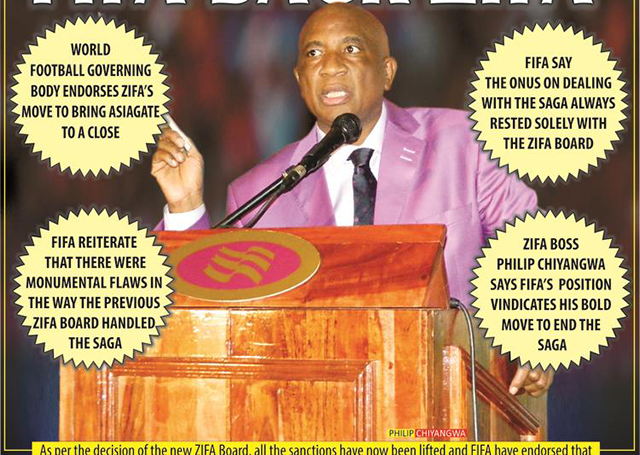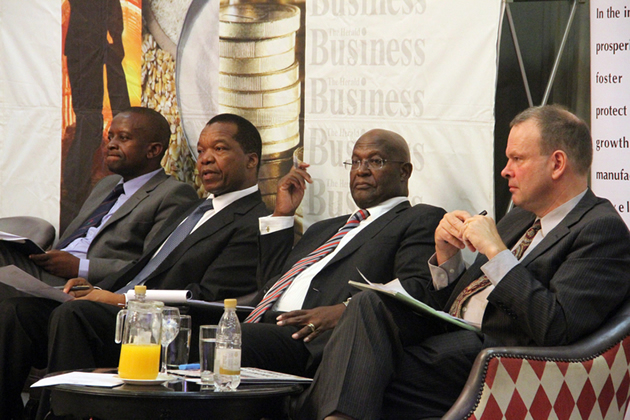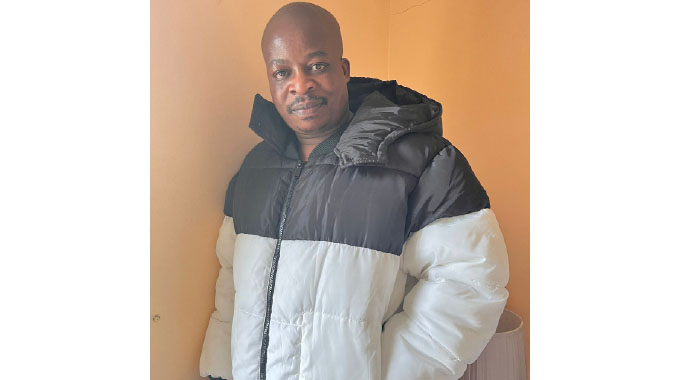FIFA BACK ZIFA

 Sports Reporter
Sports Reporter
ZIFA’S bold decision to bring closure to the Asiagate saga by lifting the remaining sanctions meted out on a number of individuals has received the backing of FIFA, in a defining endorsement which ends one of domestic football’s darkest chapters.
The world football governing body advised ZIFA — in a letter received on Monday — that they were fully behind the association’s move to bring the curtain down on this long-running saga which exploded in 2010 and has rumbled on, without closure, in the past six years.
The previous ZIFA Board, led by Cuthbert Dube, meted out a raft of sanctions on scores of individuals, including players, coaches, officials and journalists, accusing them of being part of a corrupt web which was involved in a match-fixing scam involving the Warriors during various tours to Asian countries.
Some of the people were banned for life, but in the past few years, the case has appeared to be crumbling with people like legendary coach Sunday Chidzambwa and former Warriors’ skipper Method Mwanjali having their life bans set aside and being given the freedom to return to the domestic scene.
Chidzambwa and Mwanjali were, initially, not affected by the sanctions as they were working in South Africa after FIFA refused to endorse the sanctions meted out by ZIFA to give them a worldwide effect, questioning the manner in which the exercise had been handled, why the accused were not given a chance to defend themselves and saying more evidence was required.
Despite ZIFA’s spirited attempts, including sending a number of bags of material which they considered to be incriminating evidence to Zurich, in an attempt to get FIFA to endorse their sanctions, the world football governing body refused to provide that endorsement.
FIFA said ZIFA’s use of a committee, made up of people from outside football structures, led by retired judge Justice Ebrahim, to conduct the investigations and also to pronounce sanctions, which were later endorsed by the ZIFA Board, was a violation of statutes that govern the game in this country.
The association’s failure to ensure that some of those accused were heard, to provide them with a channel to appeal against the sanctions, were also heavily criticised by FIFA who also felt that the evidence that was used was not enough, in a number of the cases they reviewed, to warrant the sanctions.
The exercise cost ZIFA more than $600 000 while the association also owes a substantial amount of money to some of the people they recruited to investigate and pronounce sanctions on various individuals.
Even when ZIFA were forced by FIFA to open an Appeals channel for those who felt that they had been given a raw deal, making them pay a staggering $6 000 in appeal fees, the outcome of the cases was not made public amid claims that the association were embarrassed that those who appealed had been cleared.
Other sources said the sticking point was the non-payment, by ZIFA, to members of that Appeals Committee, even though the accused individuals had paid $6 000 each to enable the association to bankroll the exercise.
The new ZIFA board decided to end the saga by lifting the remaining sanctions on all individuals in a landmark development.
However, ZIFA’s decision was still subject to approval by FIFA given the sensitivity of the case.
Yesterday, ZIFA president Philip Chiyangwa, who announced in his manifesto that he would bring the Asiagate saga to an end should he win the elections, revealed that their move had received the blessing of FIFA.
“I can reveal that we have received FIFA’s position regarding our decision to lift all the remaining sanctions related to Asiagate and I am happy to announce that we have been given the full backing of our superiors in Zurich for the way we handled this issue,” Chiyangwa said.
“FIFA have written to us and, in short, they are saying that they are fully behind what we did because the report, which the previous ZIFA board used to punish various individuals, was not even a report at all and cannot be recognised in the structures of football.
“There were flaws, in the manner that the previous ZIFA board handled the exercise, and one of the main problems was that they used a committee which was alien to the football structures of this country and, in football, we have structures that specifically deal with such issues as and when they crop up.
“We have the Ethics Committee and the Disciplinary Committee and FIFA were very clear in their letter that they kept advising the previous ZIFA board that such committees could not be ignored, or overlooked, when it came to dealing with such issues and, doing so, was a violation of the statutes that we should all respect and decisions from such foreigners were null and void.
“There are no provisions in football to appoint outsiders to come and investigate and pass judgment on issues related to football and, unfortunately, this is what the previous ZIFA board did and that was a violation of our statutes and, as leaders, we should not violate but protect our statutes.
“In this game you just don’t wake up and do things in a cantankerous manner because there are rules and regulations that govern everything and FIFA, as they made it clear in their letter, value that and this was, unfortunately, not respected by the previous ZIFA board.
“Even after the ZIFA board had been reminded, again and again, by FIFA that they had not handled the case in a manner that was acceptable, they somehow continued to ignore that and that is why you see that this case was going nowhere but there were some people who were suffering.”
Chiyangwa said FIFA’s decision to back their move was an endorsement of his resolution, before he even became the Association’s boss, that it would be one of his immediate assignments to ensure that he brings to an end the Asiagate saga.
“My vision was very clear when it comes to this and I am happy that even FIFA agree with what I promised, before the elections, and delivered, just after the elections when I was elected the ZIFA president,” said Chiyangwa.
“Today I feel that my resolution has been endorsed by the people at FIFA because they were very clear that this matter would only be handled by the national association, although we had to do it right, something that was not done in the past. “FIFA were clear in their letter that the national association, in our case ZIFA, is the one that has the sole discretion of dealing with an issue like this and there are committees that are there to specifically deal with such issues.
“My vision was to unite Zimbabwe football because I felt that there was something wrong with a game that is fragmented, divided by an issue that was never going to end because there were flaws in the way issues had been handled from the word go, and I am happy that I am receiving backing to ensure that we bring everyone together for the betterment of our football.
“Even though I wasn’t involved in national football administration when the Asiagate investigations were being conducted, and the report was finalised, I could tell that all this was not going to pass the test of what is expected within football’s judiciary systems and I wasn’t surprised that FIFA did not endorse the sanctions.
“Unfortunately, football lost more than $600 000 on this exercise and it’s sad given that we could have done things in a better and fairer manner with the accused, being given a chance to defend themselves and, if they were found guilty, being given a chance to appeal.”











Comments